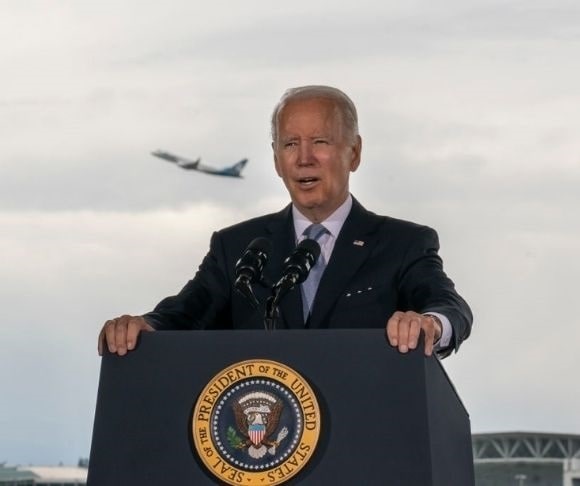Who better to announce the unilateral ending of US anti-satellite weapons testing than Vice President Kamala Harris? Despite her limited technology background, the Number Two chairs the National Space Council, and making this announcement is in her job jar. So, during a visit to Vandenberg Space Force Base, California, Harris popped the surprise announcement. Against a backdrop of somber-faced US Space Force Guardians, the Veep explained America would no longer be testing what’s called direct-ascent anti-satellite (ASAT) missiles, ground-launched to destroy satellites in orbit.
Rebecca Grant, Fox News national security analyst, pointed out:
“Here’s the kicker: the US has no plans to blow up satellites. The only true American anti-satellite test took place in 1985…Then in 2008, the US shot down a broken spy satellite, carefully timing the impact so the chunks would burn up in the atmosphere. But that’s it. That’s the whole US record, two anti-satellite shots. For Harris to make a unilateral pledge, to stop something the US wasn’t doing anyway, was bonkers.”
It’s more than “bonkers.” The decision to stop ASAT testing as a foreign policy will not dissuade Russia or China, or any other country from following suit. “Putin and Xi are laughing at her (Harris). China doesn’t do arms control. Besides, China has plans to dominate space,” Grant continued. The rationale for halting all US ASAT testing, as Harris explains, is because such testing creates space debris that presents a danger to other satellites and manned space missions.
 The White House asserts there must be “norms” for activities in space. However, those norms should not include purposefully creating space trash by practicing destroying satellites. In fairness, using ASAT technology to destroy orbiting satellites leaves the remnants of the spacecraft still in orbit. But the US hasn’t been a contributor.
The White House asserts there must be “norms” for activities in space. However, those norms should not include purposefully creating space trash by practicing destroying satellites. In fairness, using ASAT technology to destroy orbiting satellites leaves the remnants of the spacecraft still in orbit. But the US hasn’t been a contributor.
Recently, the debris from a November 2021 Russian ASAT experiment caused the crew of the International Space Station (ISS) to seek safety in an attached space capsule as the ISS might encounter the parts of the destroyed Russian satellite. Few would claim there is no cause for concern. But the US hasn’t been the culprit.
The 18th Space Defense Squadron is responsible for identifying and tracking objects in orbit around the earth, no matter how small. “So far, the 18th has identified more than 1,600 pieces of debris from the Russian test. There are over 2,800 pieces of debris still in space from China’s test 15 years ago,” Harris told her Guardian audience. These satellite pieces do place in danger other objects in orbit.
However, the effectiveness of space weapons capability is achieved through testing. Russia, China, India, and Israel understand the value of being able to hold an enemy’s space-based command, control, and communications at risk. All these nations have, at some level, developed and tested ASAT capability, according to Witanworld, an online technology information news service. A reliable, effective ASAT weapon is an arrow worth having in the quiver.

Kamala Harris (Photo by Mario Tama/Getty Images)
Space may be the final frontier, but it is also the newest potential battleground. Liberty Nation reported that, of the nations engaged in military space operations, “Only China, Russia, Iran, North Korea, and India have the ‘most public advancements’ in developing counterspace weapons.” So, in the growing threat environment, how does the Biden administration expect to get others to follow its lead in stopping ASAT testing? It’s simple: The US discontinuing its testing “will allow the United States to demonstrate our leadership in this area,” according to Acting Deputy Assistant Secretary of State for Emerging Security Challenges Eric Desautels in a Defense News article. And, presumably, friend and foe alike will follow. Unfortunately, leadership and the Biden administration have not been used in the same sentence much lately.
Effectively, Biden and Harris have hobbled the US Space Force and the US military in general regarding what it can do to refine US ASAT capability. But the People’s Republic of China and the Kremlin can hold the US’s Global Positioning Satellites, communications satellites, and intelligence gathering satellites hostage with more capable, tested ASAT missiles. Consequently, America won’t have a comparable, tested missile to hold Putin’s and Xi’s satellites at risk as a deterrent – proving once again that Biden’s foreign policy of capitulating early and often is alive and well.
The views expressed are those of the author and not of any other affiliation.




